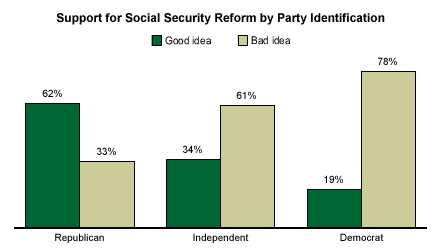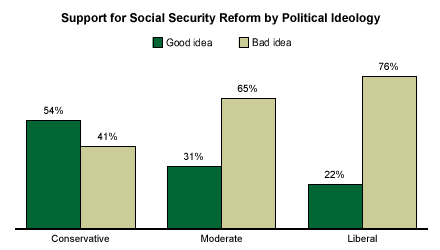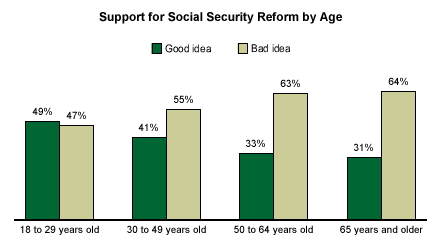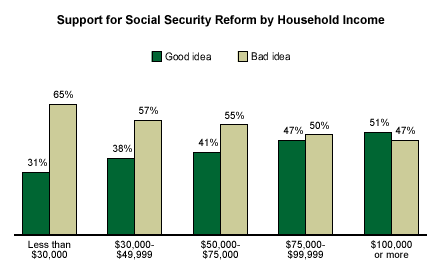Social Security will undoubtedly be one of the top items on the legislative agenda this year. President Bush is pushing for reform that likely would give workers the option to invest a portion of their Social Security taxes in individual accounts that invest in stocks and bonds. Such a plan might also reduce the guaranteed benefit that workers would receive when they retire, with the hope that the private investments might make up for the reduction and then some.
While the ultimate details of any reform proposal are yet to be worked out, recent CNN/USA Today/Gallup polls have tested the public's appetite for a reform proposal involving those two aspects. An analysis of recent Gallup polling on Social Security suggests relatively low levels of support for such a proposal.
In three polls conducted in January and February*, Gallup asked respondents the following question:
As you may know, one idea to address concerns with the Social Security system would allow people who retire in future decades to invest some of their Social Security taxes in the stock market and bonds, but would reduce the guaranteed benefits they get when they retire. Do you think this is a good idea or a bad idea?
About 4 in 10 Americans have consistently said that such a proposal is a "good idea," while slightly fewer than 6 in 10 have said it is a "bad idea." An analysis of support for the reform proposal by subgroup -- based on an aggregate of the three polls in which the question was asked -- reveals that few subgroups endorse it. Republicans and conservatives are most likely to express support, and younger Americans are more likely than older Americans to favor this reform approach. The data suggest the president would have a lot of work to do to convince others to support such a proposal.
Support by Subgroup
Americans who reside on the right-end of the political spectrum are among only a few key subgroups that show majority support for the proposal. Sixty-two percent of Republicans say it is a good idea, compared with 34% of independents and only 19% of Democrats.

Self-identified conservatives also show majority support, but at a slightly lower level (54%) than Republicans. Fewer than one in three moderates (31%) or one in four liberals (22%) believe the proposal is a good idea.

Support for the private investment/reduced guaranteed benefits trade-off declines with age, but no age group shows majority support. Forty-nine percent of 18- to 29-year-olds support the proposal, compared with 41% of 30- to 49-year-olds, 33% of 50- to 64-year-olds, and just 31% of those 65 and older.

Men are more likely than women to favor the private investment approach. Forty-four percent of men say it is a good idea, compared with 33% of women.
Whites (40%) are more likely than nonwhites (32%) to say the proposal is a good idea. Only 26% of blacks support the idea, while 72% of blacks oppose it.
Support rises with annual household income -- from a low of 31% for those in households with incomes totaling less than $30,000, to 51% in those living in households with incomes of $100,000 or more.

Bottom Line
It is still early in the debate on Social Security, and the ultimate proposal may not involve the aspects tested here. So it is unclear what the final proposals will look like, and who will wind up supporting them. Previous research shows that support for specific Social Security reform proposals depends on how the proposals are described to survey respondents.
Bush has said all ideas for reforming Social Security would be considered. And even if the final proposal did follow the outlines described here -- with private investment accounts partly paid for by a reduction in guaranteed future benefits -- public support is likely to change as the legislative leaders debate the merits of the proposal. At this stage, it looks as if there is little initial support for the proposal outside of Bush's most reliable supporters.
*These data are based on an aggregate of more than 3,000 interviews conducted in January and February 2005. For results based on the entire sample, the maximum margin of sampling error is ±2 percentage points. For subgroups, the margins of error will be higher.